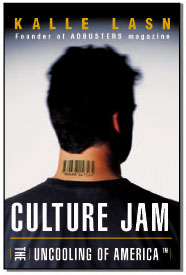|
Magazines and television screens glisten with the shrink-wrapped projections of these global uber-brands. Backwards ethnics of all stripes grunt and tap away on sleek laptops, surf the technicolored Net and are wowed by tangy taste sensations Olympic athletes race the circumference of the globe in seconds and, everywhere, people with weird accents are asking for "our beer. While these flashes of euphoric one-worldism are pleasant enough, I'm more partial to those little-reported global gaffes when some pesky local culture temporarily trips up the triumphant march of the multinationals. Sure we all speak the universal language of logos, but every once in a while, one of those insistently local languages has a way of screwing up even the best laid planetary plans. Here are just a few of my favorite potholes in the logo-paved road towards a homogenized world culture. Think of them as the last howls of resistance before we all get malled-over. Nike shot a television spot for hiking boots in Kenya using Samburu tribesmen. As one of the men speaks in his native Maa, the slogan "Just Do it'' comes up as a subtitle on screen. According to Lee Cronk, a University of Cincinnati anthropologist, the translation is less than exact. It seems that the tribesman is really saying ``I don't want these. Give me big shoes.'' Nike spokesperson Elizabeth Dolan admitted to Forbes magazine that the literal translation came as an unpleasant surprise. "We thought nobody in America would know what he said.'' British-based pop products the Spice Girls also came across a glitch in the global pop culture bubble-gum machine. On a promotional visit to Bali, the band broke into an impromptu performance of the haka, a traditional Maori war dance. Timoti Karetu of the Maori Languages Commission was not amused. ``It's denigrating of a people's culture. . . It is unacceptable.'' Maori leader Willie Jackson was less polite: "The Spice Girls are on dangerous territory by rubbishing our culture and worse still, mocking our haka. It's a bloody disgrace. We're sick of people bastardizing our culture.'' Reebok faced another kind of culture clash when it named a shoe after a character from Greek mythology before checking the pocket Berlitz. It turns out that Incubus - the name of Reebok's new shoe - was an ancient demon best known for raping women while they slept. Hardly the intended image for a company that has gone to great lengths to associate itself with female empowerment and human rights. Language mishaps abound in the global branding game where companies are always more than happy to lay out millions for a single ad campaign but seem unwilling to spring for a decent translator. A Coca-Cola ad campaign in China translated the soft drink's name to"`Bite the wax tadpole.'' When Warner Brothers launched Looney Tunes in China, Bugs Bunny was given the unfortunate name of Tu Ba Ge, which means "Big Brother Rabbit.'' Meanwhile, a sexy new model Ford hit the roads in South America with the fiery name of Fiera - Spanish for "ugly old woman.'' All of these are harmless compared to the mess in which Microsoft found itself after the China launch of Windows 95. An editing program with a feature that anticipates the ending of common phrases was finishing sentences in rather inflammatory ways. The program, licensed from a Taiwanese company, referred to Chinese leaders as "Communist bandits'' and exhorted the Taiwanese government to "take back the mainland.'' Perhaps there are still some conflicts on this small planet too complicated even for software companies to solve. Culture Jam - The Uncooling Of America Paperback, 252 pages Published by HarperCollins Kalle Lasn, editor of Adbusters magazine, argues that America is no longer a country, but a multitrillion-dollar brand. America is no different from McDonaldıs, Marlboro or General Motors. Itıs an image "sold" not only to the citizens of the U.S.A., but to consumers worldwide. The American brand is associated with catchwords such as "democracy," "opportunity" and "freedom." But like cigarettes that are sold as symbols of vitality and youthful rebellion, the American reality is very different from its brand image. America has been subverted by corporate agendas. Itıs elected officials bow before corporate power as a condition of their survival in office. A collective sense of powerlessness and disillusionment has set in. A deeply felt sense of betrayal is brewing..
|

